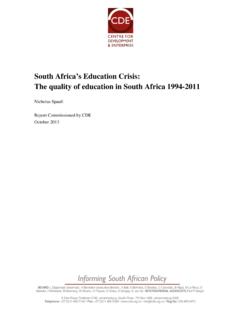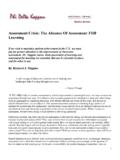Transcription of Ralph Bunche 10
1 Ralph Bunchethe odyssey : Module 10aPoorly prepared for independence, the Democratic Republic of the Congo has barely celebrated its independence on June 30, 1960, before it is plunged into crisis . crisis in the Congo, Part 1 covers the story through the point at which United Nations troops are guarding the life of Prime Minister Patrice Lumumba, and includes: the independence celebration, with its portents of troubles to come; mutiny in the Congolese army; Belgium s decision to send in troops to protect Belgian nationals and Belgian business interests; the announced secession of resource-rich Katanga province under Moise Tshombe; Lumumba s appeal to the for help.
2 Lumumba s contacts with the Soviet Union and his distrust of the West in general; attempts on Lumumba s life by the CIA; Bunche s management of the crisis on a near daily level; the disagreement within the Security Council and between Lumumba and the in the Congo10M O D U L E27 minutesMODULE 10 :: crisis in the Congo Synopsis: Module 10b crisis in the Congo, Part 2 picks up the story as chaos and violence increases in the Congo. Bunche and Dag Hammarskj ld work feverishly to try to prevent the conflict from engulfing the continent and escalating into a war between the power blocs of East and West.
3 This module includes: Bunche s visit to Katanga province, which he assesses as being too dangerous for the deployment of unarmed troops; the Security Council s demand that Belgium withdraw its troops; Lumumba s increasing belligerence and distrust of the and Bunche ; Bunche s deteriorating health under the stress of the situation and his return to New York; the collapse of the Congolese government, and coup by General Mobutu; the kidnapping and murder of Patrice Lumumba and resulting demon-strations worldwide; cooperation with Cyrille Adoula as new prime minister; Hammarskj ld s death in a plane crash, and U Thant s subsequent appointment to fill out his term; Tshombe s continued determination to secede in Katanga Province.
4 Authorization of peacekeeping troops to use force to drive the foreign mercenaries out of Katanga, resulting in the collapse of the secession minutesMODULE 10 :: crisis in the Congo Historical BackgroundChapters XI and XII of the United Nations Charter had laid the groundwork for self-determination and the eventual independence of peoples living in the so-called non-self governing territories. In Africa, the process began with the independence of Ghana and Sudan in 1957. In 1960 fourteen African nations were slated for inde-pendence, including the Belgian Congo.
5 A country of extraordinary natural wealth and resources, the Congo had been systematically looted by its Belgian colonizers for over sixty years and was ill-prepared for independence. The colonial government had kept native Congolese from any positions of responsibility and power. Out of thirteen and a half million Congolese, only seventeen had university degrees, and there were no African officers in the Congolese winning the Nobel Peace Prize in 1950, Ralph Bunche had continued to work at the United Nations. In 1953, he coordinated the Atoms for Peace project; was appointed Undersecretary-General in 1954; directed the first peacekeeping op-erations in Suez in 1956; and, in 1957, was appointed Undersecretary-General of the for Special Political Affairs, with responsibilities that included overseeing peacekeeping activities 1960, Bunche represents the United Nations at the independence ceremonies in the Congo and stays over to offer technical assistance to the new government.
6 When the army mutinies and Prime Minister Lumumba asks the for peacekeeping sup-port, Bunche is asked to stay on to coordinate that effort. By the time he leaves the Congo on August 21, 1960, Bunche s health has seriously deteriorated.*Relevant Standards National Council for the Social Studies StrandsStrand II. Time, Continuity, & Change Social studies programs should include experiences that provide for the study of the ways human beings view themselves in and over time, so that the learn-er can: (c) identify and describe significant historical periods and patterns of change within and across cultures, such , economic and political revolutions.
7 (e) investigate, interpret, and analyze multiple historical and con-temporary viewpoints within and across cultures related to important events, recurring dilemmas, and persistent issues, while employing empathy, skepti-cism, and critical judgment.* See pages 13-15 in this Supplement for a detailed timeline showing events in the Congo in 1960 and 10 :: crisis in the Congo Strand V. Individuals, Groups, & Institutions Social studies programs should include experiences that provide for the study of interactions among individuals, groups, and institutions, so that the learner can: (b) analyze group and institutional influences on people, events, and elements of culture in both historical and contemporary VI.
8 Power, Authority, & Governance Social studies programs should include experiences that provide for the study of how people create and change structures of power, authority, and governance, so that the learner can: (d) compare and analyze the ways nations and organi-zations respond to conflicts between forces of unity and forces of VII. Production, Distribution, & Consumption Social studies programs should include experiences that provide for the study of how people organize for the production, distribution, and consumption of goods and services, so that the learner can.
9 (h) apply economic concepts and reasoning when evaluating historical and contemporary social developments and This Module (in order of appearance) TeRMS To knoW ModuleS 10a & 10bcolony, colonialism, the Soviet Union, decolonization, blanc, paternalistic, mutiny, Africanization, the West, the East, Force Publique, Balkans/balkanization, tribalization, the Cold War, plantations, the CIAPeoPle RefeRenCed ModuleS 10a & 10bDag Hammarskj ld, King Baudouin of Belgium, Patrice Lumumba, King Leopold of Belgium (1865-1909), Moise Tshombe, Nikita Khrushchev, Joseph Kasavubu, Joseph Mobutu, Godefroid Munongo, Cyrille Adoula, Major-General Indar Jit RikhyePlaCeS RefeRenCed ModuleS 10a & 10bBelgium, the Congo, Katanga Province, the West, the East, the Soviet UnionPeoPle on SCReen Module 10aF.
10 T. Liu, Lloyd Garrison, Thomas Kanza, Sir Brian Urquhart, Ralph Bunche , Jr., Dr. Ronald Walters, Dr. David Levering LewisPeoPle on SCReen Module 10bSir Brian Urquhart, Dr. David Levering Lewis, Major General Indar Jit Rikhye, F. T. Liu, Thomas Kanza, Amiri Baraka, Dr. Ronald Walters, Robert Edgar, Robert Hill, Dr. W. Ofuatey-KodjoeMODULE 10 :: crisis in the Congo Strand IX. Global Connections Social studies programs should include experiences that provide for the study of global connections and interdependence, so that the learner can: (b) explain conditions and motivations that contribute to conflict, coopera-tion and interdependence among groups, societies, and nations.







